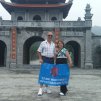Find your tours
Planning a trip today can be confusing and time consuming. MinMax Travel not only arranges the various modes of transportation, but also may be able to save you money with early booking discounts, special fares, hotel deals and travel advisories. Don't take our word for it. See what the previous customer has to say about MinMax Travel.
Read about Our Service
Why book
with us ?
with us ?
What people say about Minmax travel ?
Dear Jennifer, Allow me to express my and my wife's gratitude for the excellent tour that you organised for us. All the hotels that you chose for us were wonderful. The meals we had were all outstanding and the...


